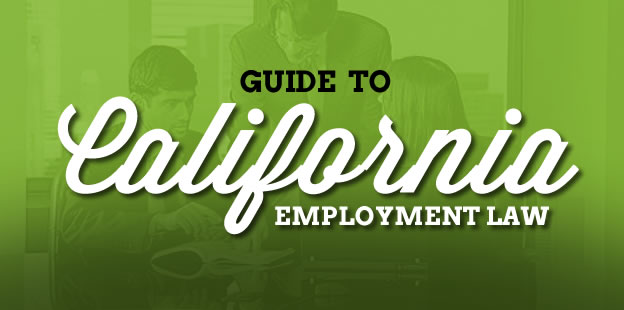You go to work, you do your job, you earn a paycheck and you go home. Your employment seems simple enough, until one day your employer begins to make suggestive remarks about your attire. Or you throw out your back but are forced to show up at the office. Or you stay after hours to finish a project, but don’t get paid for it.
Employers and workers butt heads every day, and most of the time it’s a common relationship that both roles need to work on together. However, other times there are laws in place that can protect either party. We have put together a complete guide to California employment law to answer any questions that you may have about your work environment and details about your employment.
Wage Requirements
You’re in it for the money, right? So let’s start with the basics and take a look at California’s wage, overtime pay, break and vacation requirements.
California’s employees are some of the most highly respected and protected in the U.S. when it comes to fair pay. Employer legal requirements in California surpass those in other states, both in quantity and complexity. The following is a list of standards that employers and employees must adhere to:
 Minimum Wage
Minimum Wage
While the federal minimum wage is currently set at $7.25 per hour, California’s minimum wage is higher at $10.50 per hour. This wage is all-inclusive, unlike many other states. This means that all work, on and off the clock (even if volunteered) is subject to minimum wage pay. Service workers who pull in tips in addition to their hourly pay are also required to be paid $10.50 per hour. Although California’s set minimum wage requirement is $10.50 per hour, there are regions of the state that have taken matters into their own hands. For example, San Francisco recently increased it’s minimum wage to $14.00 per hour due to the high cost of living in the area.
 Overtime and Breaks
Overtime and Breaks
California state law has implemented strict rules and regulations in regard to overtime pay and regimented employee breaks. Repercussions for employers who fail to adhere to those laws are equally as stern. Overtime pay is mandatory for workers who perform work more than eight hours in a day or 40 hours over the course of one week. Overtime is easily calculated as one and a half times an employee’s normal pay. Double pay kicks in when an employee works more than 12 hours in one day. Most California employees are entitled to a paid ten-minute break every four hours as well as an unpaid 30-minute meal break every five hours.
 Vacation
Vacation
Planning a trip? Before you pack up your swimsuit and sunscreen you should be sure to understand what you are entitled to. Contrary to popular belief, there is no set law in California that requires employers to provide their employees with paid vacation time. The good news is that even so, most employers do allow some sort of paid vacation. Those employers who do choose to supply vacation hours can do so on their own terms. That means that they have the ability to establish black-out days, and to set specific rules as to how and when the vacation time can be used. Vacation hours are treated as wages in California, meaning that if an employee is allotted a certain amount of vacation time and chooses not to use that time out of the office, that worker must get paid for them. This means that an employee who is allowed vacation time can opt out of taking a trip, and instead collect extra wages.
 Quitting and Termination
Quitting and Termination
If an employee provides sufficient notice of at least 72 hours before leaving a position, all of their pay must be provided to them before they leave. Similarly, if an employee is fired or laid off they must be paid in full immediately.
Discrimination Laws
Numerous state and federal laws are in place to ensure that employees are not discriminated against in regard to race, age, gender or medical condition.
The following Acts work to prevent any type of workplace discrimination:
California’s Fair Employment and Housing Act
The California Unlawful Business Practices Act
California’s Private Attorneys General Act
Title VII of the federal Civil Rights Act of 1964
 Racial Discrimination
Racial Discrimination
 California state and federal law prohibits employers from discriminating employees based on race, color, ethnicity or national origin in regard to hiring, firing, reviewing applicants, promotions, transfers, pay grade, task assignment, vacation and working conditions.There are two different types of racial discrimination in the workplace: disparate treatment and disparate impact. Disparate treatment occurs when an employee is treated poorly because of his or her race, ethnicity, color or origin. Disparate impact happens when an employer’s values and policies benefit one specific group of people, but not another.
California state and federal law prohibits employers from discriminating employees based on race, color, ethnicity or national origin in regard to hiring, firing, reviewing applicants, promotions, transfers, pay grade, task assignment, vacation and working conditions.There are two different types of racial discrimination in the workplace: disparate treatment and disparate impact. Disparate treatment occurs when an employee is treated poorly because of his or her race, ethnicity, color or origin. Disparate impact happens when an employer’s values and policies benefit one specific group of people, but not another.
 Age Discrimination
Age Discrimination
 Employers often demonstrate favoritism through age discrimination. This usually involves an employer offering advantages to younger workers who demand less pay and have the youthful appearance an employer may want to use to portray their business. The following are two separate sets of laws that provide employees who are more than 40 years old with protection:ADEA: The Age Discrimination in Employment Act was passed by Congress in 1967 to address discrimination against older workers. The ADEA makes it illegal for any employer to discharge any individual over 40 years old, or otherwise discriminate against anyone in respect to their age.FEHA: California state laws address age discrimination more specifically. The Fair Employment and Housing Act has a broader reach than the ADEA, as it covers any and all companies regardless of size (ADEA only applies to companies with 20 or more employees).
Employers often demonstrate favoritism through age discrimination. This usually involves an employer offering advantages to younger workers who demand less pay and have the youthful appearance an employer may want to use to portray their business. The following are two separate sets of laws that provide employees who are more than 40 years old with protection:ADEA: The Age Discrimination in Employment Act was passed by Congress in 1967 to address discrimination against older workers. The ADEA makes it illegal for any employer to discharge any individual over 40 years old, or otherwise discriminate against anyone in respect to their age.FEHA: California state laws address age discrimination more specifically. The Fair Employment and Housing Act has a broader reach than the ADEA, as it covers any and all companies regardless of size (ADEA only applies to companies with 20 or more employees).
 Gender Discrimination
Gender Discrimination
 Both women and men are protected from disparate impact and disparate treatment gender discrimination in the workplace (meaning direct and indirect preference and favoritism). Title VII of the Civil Rights Act of 1964 bans sex and gender discrimination by employers of more than 15 employees.Equal Pay Act: “The Equal Pay Act requires that men and women be given equal pay for equal work in the same establishment. The jobs need not be identical, but they must be substantially equal. It is job content, not job titles, that determines whether jobs are substantially equal.”
Both women and men are protected from disparate impact and disparate treatment gender discrimination in the workplace (meaning direct and indirect preference and favoritism). Title VII of the Civil Rights Act of 1964 bans sex and gender discrimination by employers of more than 15 employees.Equal Pay Act: “The Equal Pay Act requires that men and women be given equal pay for equal work in the same establishment. The jobs need not be identical, but they must be substantially equal. It is job content, not job titles, that determines whether jobs are substantially equal.”
 Pregnancy Discrimination
Pregnancy Discrimination
 Pregnancy discrimination is a form of gender discrimination that is being more and more commonly reported.
Pregnancy discrimination is a form of gender discrimination that is being more and more commonly reported.
The U.S. Equal Employment Opportunity Commission defines pregnancy discrimination as any behavior that involves treating a woman, whether an applicant or an employee, unfavorably because of pregnancy, childbirth or a medical condition related to pregnancy or childbirth. Rigorous federal and state statutes are in place to protect the working rights of pregnant women.
The Pregnancy Discrimination Act prohibits such discrimination in all aspects of the work environment, and holds that pregnancy must be treated as any other medical condition or disability. This means that just as an employee with any other condition or disability, pregnant women are entitled to lighter duty, alternative assignments, and disability leave or unpaid leave.
California’s Fair Employment and Housing Act forbids employers from discriminating against an employee for becoming pregnant or for requesting time off to tend to pregnancy-related needs.
The California Family Rights Act broadens privileges to mothers after they have completed their pregnancy and delivered their baby. Under the CFRA a mother may be entitled to an extension of up to 12 weeks of additional leave.
The California Pregnancy Disability Leave Law requires employers to cater to the needs of women who have had complications during their pregnancy by providing up to four months of extended leave.
Sick Pay and Medical Leave of Absence
 Time off and requests for time off due to illness are the most commonly encountered inquiries employers and human resources administrators face when it comes to employment law. Below we will go over taking time off for illness, or “sick pay,” and medical leaves of absence.
Time off and requests for time off due to illness are the most commonly encountered inquiries employers and human resources administrators face when it comes to employment law. Below we will go over taking time off for illness, or “sick pay,” and medical leaves of absence.
Employees often mistakenly equate sick pay with vacation pay. “Sick” hours are treated differently than vacation hours, and the terms of sick pay vary among different employers and individual situations. Similar to vacation pay, California does not require employers to supply their employees with sick pay. If an employer does choose to include sick pay, half of the allotted time off can usually be used to care for an ill family member. If an employee requires more time off than their sick pay allows, they can take an unpaid medical leave of absence. In special scenarios, workers may qualify for up to six weeks of partially paid time off.
Medical leaves of absence are different from sick days, and are regulated by the following state and federal laws:
 The Family and Medical Leave Act
The Family and Medical Leave Act
This act allows eligible employees to take unpaid leave, with the right to reinstatement, for certain purposes. Employees are eligible if they have worked for the company for at least one year, worked at least 1,250 hours during the previous year and worked at a company location that had at least 50 employees within a 75-mile radius. Plausible reasons for FMLA are to bond with a new child, to recuperate from a serious health condition, to take care of a family member who has a serious health condition, to handle problems/health conditions that arise out of a family member’s military work.
 California Family Rights Act
California Family Rights Act
Companies with 50 or more employees must permit eligible employees to take up to 12 weeks off in a one-year period for the birth, adoption or foster placement of a child; for the employee’s serious health condition; for the care of a family member’s serious health condition. The state of California also has options for military family leave, pregnancy disability leave, small necessities leave, domestic violence leave and temporary disability funding.
Drug and Alcohol Testing
While drug and alcohol testing is allowed in California, it is only permitted under certain circumstances:

 Prior to employment and/or immediately after hiring
Prior to employment and/or immediately after hiring
California employment law allows employers to require all prospective employees to adhere to a drug and alcohol test – not because suspicion is raised, but because the exam is compulsory.
 Random drug testing
Random drug testing
This practice is generally intolerable, although some California courts have upheld such testing under certain circumstances such as reasonable suspicion of drug or alcohol abuse. Employers who choose to randomly test are walking on a tightrope, as it is likely that a court will find them falling short of probable cause.
 The exception
The exception
In the transportation industry, employees are held to a higher standard when it comes to sobriety. Both federal and state laws impose strict requirements on employees who operate heavy machinery and engage in commercial transportation, and those employees may be required to submit to drug and alcohol tests.
 California and Federal Drug-Free Workplace Acts
California and Federal Drug-Free Workplace Acts
If an employer has entered into a federal or state contract in which they receive grants and agree to provide a drug-free work environment, they may allow testing under the guidance of certain regulations.
Workplace Retaliation and Whistleblower Protection
 California has many laws in place to protect employees from discrimination, harassment and unfair action. To enforce employment security and to offer further protection, there are also laws that protect employees from employer retaliation.
California has many laws in place to protect employees from discrimination, harassment and unfair action. To enforce employment security and to offer further protection, there are also laws that protect employees from employer retaliation.
Whistleblowers are employees who recognize any type of unlawful or unethical behavior on the part of the employer, and inform the government or a law-enforcement agency. Under California state law, an employer is legally unable to retaliate against a whistleblower in any form. Employers have a responsibility to their staff to provide a fair and safe work environment, and employees are encouraged to report them if they fail to do so.
Whistleblower retaliation is deemed unlawful under the following conditions:
![]() An employee-employer relationship exists
An employee-employer relationship exists
![]() The employer was fired or experienced some other form of adverse treatment
The employer was fired or experienced some other form of adverse treatment
![]() The protected activity and the employer’s adverse action were casually connected
The protected activity and the employer’s adverse action were casually connected
Wrongful Termination
California is an at-will employment state, meaning that an employee may quit or be fired at any time for any reason at all, as long as the reason isn’t illegal. The following are exceptions to the at-will employment rule:
 Written contract or statement
Written contract or statement
If an employee has a contract that promises job security, as well as documentation that states specific reasons that an employee may be terminated, they may be able to enforce the contract in court.
 Implied promises
Implied promises
This is an unwritten, oral or implied contract or statement. Implied promises are, as to be expected, more difficult to prove in court.
 Breach of good faith and fair dealing
Breach of good faith and fair dealing
An employer’s unfair actions or demands, such as promising employees unattainable pay increases, soft-pedaling bad aspects of a job or repeatedly transferring employees.
 Violations of public policy
Violations of public policy
An employer may be in violation of this exception to at-will employment if they punish or fire an employee for any of the following reasons:
- Taking time off to serve on a jury
- Taking time off to vote
- Serving in the military
- Whistle-blowing
- Discrimination
- Fraud
- Defamation
Unemployment Eligibility
In California employees who are temporarily out of work may collect unemployment benefits for a number of reasons. Eligibility is based on various factors, such as prior earnings, benefits and other thresholds created by the Employment Development Department.
In order for a California resident to begin collecting unemployment benefits, there are three basic qualifying factors that they must meet:
 Past Wages
Past Wages
The Employment Department will take a look at the recent work history and wages of an individual who files for unemployment benefits. In California qualified applicants must have earned at least $1,300 in their highest paid quarter of the base period, or have earned at least $900 in their highest paid quarter of the base period as well as at least 1.25 times their earnings in the highest paid quarter during the entire base period.
 Reason
Reason
An unemployment applicant must be out of work through no fault of his or her own. Most people who collect unemployment benefits have been laid off from their jobs, either permanently or temporarily. When an employee is laid off, loses a job in a reduction-in-force or gets downsized for economic reasons, he or she will meet the department’s requirements.
 Available and Actively Seeking Work
Available and Actively Seeking Work
Out of work employees must prove that they are immediately available for work, and that they are actively seeking work. The Employment Development Department will likely ask for documentation of employers that the individual has contacted, the dates that that person made contact and the outcome of the interaction.
2013 Legislation Affecting California Employers
 California Governor Jerry Brown passed new legalization to affect employers’ daily operations and policies. The most highly influenced areas are anti-discrimination protections, employee access to records and employer access to employees’ personal accounts.
California Governor Jerry Brown passed new legalization to affect employers’ daily operations and policies. The most highly influenced areas are anti-discrimination protections, employee access to records and employer access to employees’ personal accounts.
While the Assembly Bill 1964 clarifies discrimination policies, another anti-discrimination bill titled AB 2386 has changed the definition of “sex” under the Fain Employment and Housing Act, for the purposes of protecting breastfeeding and related medical conditions from discrimination and harassment.
When it comes to employers employees’ personal information, it has become common practice to “spy” on potential employees by looking at their social media accounts and plugging their names into search engines. However, more recently employers are actually asking prospective employees for their login information. Assembly Bill 1844 works to prohibit employers from requiring such information from job applicants. Limited exceptions to the law involve issues relating to employer investigations.
Assembly Bill 2674 amends the Labor Code relating to inspection and retention of personnel records. It changes who has the right to inspect files, alters deadlines to access files, changes where and how records may be available and includes penalties for employers who fail to comply.
The following is a list of other amendments to California employer legislation:
Itemized wage statements/Temporary service employees
Penalties for wage statement violations
Commission agreements
Fixed salaries and overtime
Wage garnishment
Human trafficking posting
Workers compensation reform
Accessibility reform
FEHC eliminated, duties transferred to the DFEH
Intellectual disabilities
Unemployment insurance: overpayment and penalties
Prevailing wage
Farm labor contractors
Warehouse workers




1 Comment